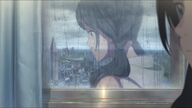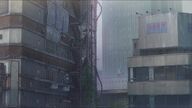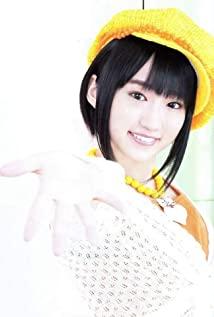Let’s start with the film screenings in Japan. The fact that Banghua doesn't have subtitles by default makes me, a newcomer, feel a little tired. Don't break your nerves all the time throughout the show. Before buying the tickets, the staff who specifically called for inquiries asked whether there is a subtitle version. The answer was that the subtitle version will not be available until August 25, which is almost a month later. I asked at the time, regardless of foreigners, if a friend with hearing disabilities wants to watch a movie with me, what should I do? The other party was speechless. This is a strange place in Japan, and it is also a very incomplete place. Will this indirectly lead to the discrimination of the disabled? Can't go to the same movie with friends of normal people, just because the broadcaster does not add subtitles. This is worth thinking about.
Next, I will discuss my first feelings. As it is the first impression, there are some areas where the analysis is not in place, and this is the first time I have watched a Japanese movie without subtitles. Generally speaking, judging from the judgment criteria that I pay attention to logic, narrative, and finally expounded thoughts, the quality of the film is low. Of course, the pictures and music are all excellent, but these can only be the icing on the cake, and cannot turn decadence into magic.
The male protagonist, Taka, is a young man who is leaning against his family. First of all, there is no reasonable and convincing explanation around his reasons for leaning his family and the life he wants to find in Tokyo. Regarding the reason for his family, from the words of the male protagonist, the only answer in the whole play after being asked by the female protagonist ヒナ, and the description of the male protagonist's own memories of chasing a beam of light in the cloudy sky when he was in his hometown. I can only understand that he was depressed and unhappy in his hometown all day long, and lost his position in the family, so he came to Tokyo and wanted to be self-reliant, start a new life, and escape from his decadent hometown. First of all, this reason works well, but on the contrary, it is very boring, and it has obvious traces of theatrical design, because in order to let the male lead go to Tokyo, a little explanation was added. First of all, its actions are naive. But so far there is no problem.
What follows is very clichéd. The drifter meets an enthusiastic uncle who is nosy, and finally helps him with the pattern setting after Mataka runs into a wall in Tokyo. I sigh once again that the Japanese people are really enthusiastic. They are a third-rate magazine and they can also take in a minor who is swayed by the family and refuse to persuade him to return home. The arrangement here can only make people feel deliberate, and the logic is weak. And this time, I also added an unknown role specially, the big sister who was dubbed by Honda Wing, who provided サービス, please click here first.
The male protagonist bumped into walls everywhere in Tokyo. On the way to the bitterness of the world, he picked up a pistol loaded with live ammunition and took it as his own? Surprised! Even if you can't report to the police station because of your family, you shouldn't take this kind of thing that may cause you huge trouble as your own, right? ! It can only once again make people unable to feel the sense of design deliberately. By the way, I also ran into an enthusiastic, lovely and beautiful female protagonist, who risked being fired, risking the risk of cutting off their financial resources, and secretly adding meals to the male protagonist. The Japanese people are really enthusiastic.
At this point in the film, apart from showing the warmth and coldness of the world in big cities in a far-fetched way, it has failed to show anything else.
After that, the male and female protagonists met, and I felt that the film only started here, and it can be said that the structure is not loose. The male protagonist who went out armed with guns and live ammunition met the female protagonist who had lost his job because of charity and had to go to the underground camp. After misunderstanding and fighting, he excitedly took out his gun and shot the pimped vulgarity. People don’t know here, so why would anyone carry a pistol in a pocket and take to the streets all day? Regardless of these small flaws, the story really begins after the hero and the hero meet. Every family has hard-to-read sutras. The uncle who was dubbed by Shun Oguri was separated from his wife, and he couldn't see his cherished daughter. The big sister who was dubbed by Honda Tsubasa was struggling to survive. Because of the death of his mother, ヒナさん had to bear the family's back. Heavy burden. If you can make a deeper anatomy of these settings, there may be a better story, but the film chooses to take a very simple path.
Give the heroine the ability to change the weather.
After the hostess met, the hostess invited such a dangerous young man who carried a gun out to conduct strange interviews to his home as a guest and welcomed him enthusiastically. Please, you still have a brother! He is a dangerous man with a gun. After a conversation, the two finally decided to make money with super powers.
Then for a long period of time the plot was about how they made this super power to make money and make it bigger and stronger. In addition, it is how susceptible people are and how susceptible they are to the weather. The film solidifies sunny days into symbols that bring positive emotions, and solidifies rainy days into symbols that bring negative emotions. This is the premise to illustrate the relationship between weather and mood. I think it is too sloppy and simple, which leads to the theme here. Did not play well. Personally, I prefer rainy days in summer, with few people and cool. Of course, although the love section is interesting, it is not enough to hold up the whole movie.
Then we arrived at the most important place, in the conversation with Grandma Tachibana at Tachibana Taki's house (I haven't read a novel, but there is still a grandma, so are you keeping in touch with Mitsuba? I really want to know!), as well as taking the material. Dialogue with the grandpa of the shrine. An important piece of information can be learned from this. The abilities possessed by ヒナ have existed since ancient times. They have played an important role in regulating weather and controlling weather diseases (abnormal weather). However, the so-called maiden of Tianqi will have a miserable ending. This ending is to become a human pillar, in exchange for the end of the abnormal weather, so as to save everyone. And the heroine, Nana, is such a person who desperately supports the livelihood of the family for her younger brother, deliberately falsely reported her age in front of the hero, and plays the role of a gentle sister who takes care of others and gives love. Even the prayers at the shrines that have gained super powers are for their seriously ill mother.
And the male protagonist Taka can't help being naive. From the reason to stay home, to the way he and the younger brothers of ヒナさん and ヒナ rely on superpowers to make a living on the right track, all relying on the favor of others. This is incomparable with Kafka's sixteen-year-old who is the strongest in the world. Although he intends to stand on his own in Tokyo, he has always been protected, his life is relieved by his uncle, and his spirit is comforted by ヒナ.
The inevitable result of these two personalities also pushed the plot to a climax. The sloppy behavior of the male protagonist ホtaka caused the police to disrupt their lives; and the unrelenting dedication of the female protagonist ヒナ, especially after she became a woman who brought happiness to others, she could not extricate herself from it. , So Taki’s grandma said she was a little reluctant, which made her quickly have to repay the price of this power-to go to the heavenly world as a human pillar to make the world clear.
When he was entangled by the police and had to change his residence, the two men who made him live in Tokyo, the uncle and the hostess, agreed to let him go back. This can be understood as letting him return to reality, recognizing that he can do nothing and save the status quo. But he still persisted in staying next to ヒナ sister and brother, thinking that he could protect his current life. The final outcome is of course the awakening of dreams, and the three are torn apart. ヒナ became Renzhuli, and the other two were taken away by the police.
At this time, the protected male protagonist, Taka, finally realized his naivety and powerlessness. He is the eldest of the three, but he regards one as a lover like a sister, and calls the other senior. Without the support of the uncle, even a shelter would be difficult to find. Without ヒナさん, there would not be so many happy and happy times. So he repented, wanted to rescue ヒナ, wanted to really give, wanted to really protect. So here comes a solo ride that sees the Tokyo police as inappropriate (there is also the help of the big sister dubbed by Honda Tsubasa, who is the most inexistent in the show). Finally, there was another childish confrontation with guns. I don't understand why there are guns in this play? What metaphor does Xin Haicheng want to use as a metaphor? So far, my explanation means that through two changes in the mood and determination of holding a gun, the growth of the character is highlighted. But in any case, it is inappropriate to use a gun as a metaphor. Guns are used to kill people, not to save people. And in the end, if the uncle who was not dubbed by Oguri Shun saw himself in the hero and was moved, and helped him knock down the police and ヒナ's younger brother arrived in time because of his handsome appearance, he would still be unable to save the heroine. Looking at it this way, the subject of growth has also become vague.
At the climax of the film, the male protagonist has a strong hope to see ヒナ (after all, he shouted all the way to meet いたい) praying, and successfully reach the other side of the world and rescue the female protagonist. There is a sentence worth thinking about here. ホタカ said to ヒナ, pray for himself, so ヒナ did it, and then the two men returned to the real world, and ヒナ got rid of the fate of Renzhuli. But the price is that the rain in Tokyo cannot be stopped, that is, the weather cannot be cured, which has caused most of Tokyo to be flooded, including Grandma Taki's house (Is it grandma or grandma? Is it a character in the novel?). Then the male protagonist was sent back to his hometown for nursing and was forced to separate from the female protagonist. He did not contact the female protagonist for three years. According to the male protagonist, it was mainly because of guilt. Is it the guilt that Tokyo is overwhelmed? In short, three years after the camera was turned, the male lead graduated from high school at noon and came to Tokyo again, but he was reluctant to meet ヒナ. He went to see his uncle and grandma Taki. And both express a meaning in unison. This world has become like this. It is not so much your fault as it is that the world itself is like this. The uncle said that the nature of the world is an aberration. Grandma Taki said that Tokyo just went back to the past because it was like this, even In history, there are even more than this (the narrative of the name of the king over time). But in the end, Taka finally plucked up the courage to meet ヒナ but found that she had been praying. Seeing this situation, Mataka couldn't help shrinking for a moment, but the next moment, he looked at ヒナ, as if thinking of something again, holding the ring for ヒナ, thinking in his heart that we must be able to do it, smiled and walked towards ヒナ. End.
This is the most difficult part. It should be the part of sublimation, but it didn't make me feel this way. Combine what I said worth thinking about. Is it true that ヒナ obeyed Taka and prayed for himself? But she should know that if she is not a human pillar, the world will be abnormal and the rainstorm will not stop. In the end, she stood on the banquet where the two went home, praying to the sky, is she praying for the world to return to normal? So what kind of mentality did she face to Taka? I think there are two things to say about these issues. Perhaps this is the first time I have watched raw meat without subtitles. Many details have not been observed, but it is still impossible to deny that the perspective, feelings, thoughts, and descriptions of the heroine ヒナ are too few in this drama. This is also one of the reasons why the final theme is unclear.
If summed up from the perspective of the male protagonist Taka, his final words and actions should indicate that he no longer struggles with his decision to rescue the female protagonist Tana, and decides to find the future with her in this so-called "abnormal" world. Does this show the film's hope for modern Japanese society? After all, like a king's name, all magic is a metaphor for reality. I think this is the current style of Xin Haicheng.
The plot is listed again. Although it is supported by several lines such as growth and social conflicts and contradictions, love, etc., without exception, it is not deep or extended. The development and promotion of the plot depends on the fault of the male protagonist. Reasonable and illogical actions. Several supporting roles are not very functional. The only thing that can be explained is Shun Oguri's uncle. This is a young character who wanders in Tokyo, who has been rubbed off by society, but finally moved by the male protagonist and gradually finds his own feelings. It can be said that it is a role that corresponds to the impression that the male protagonist has a high probability of becoming an adult. And ヒナ's younger brother is taking on the role of cuteness and the role of promoting the plot. If these two roles are reasonable, then the big sister of Honda Wing is really difficult to explain, maybe she can do whatever she wants if she is beautiful.
This is what I feel right now. From the perspective of the director and objectively speaking, compared with the name of the last king, the plot is quite different. Even in the aspect of mobilizing the audience's simplest feelings, he can't match the name of the king. The shouting in the sky in the last scene is far less powerful than the difference between the two after dusk. And the most important thing is that many places cannot be self-consistent. Perhaps there are also reasons why I did not observe carefully. Welcome everyone to discuss. I still look forward to Ninokuni, or watch it again when the subtitled version for the disabled is released. I feel that Xin Haicheng still has something to express, but he didn't innovate in the structure of the story and the way of expression, and still wanted to use the old style of the king's name.
View more about Weathering with You reviews










